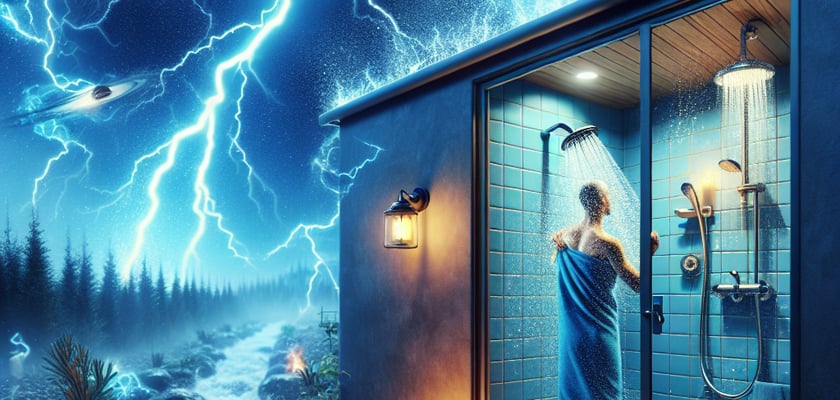Thunderstorms are nature’s very own light and sound spectacular, arguably better than any rock concert or fireworks display you’ve ever seen – that is until you decide to belt out your own rendition of “Singing in the Rain” in the shower while Zeus is hurling bolts of electricity through the sky. Showering during a thunderstorm is one of those surprisingly risky activities that most people aren’t even aware of. I mean, taking a shower is all about getting squeaky clean, not about an electrifying surprise that could make your hair stand on end, quite literally! Showering in a thunderstorm might seem like a harmless act of rebellion against Mother Nature’s bad mood, but it could turn your rubber ducky into your last bath buddy. Water is an excellent conductor of electricity, and since your plumbing isn’t picky about who it hangs out with, it could very well bring an unwelcome jolt right to your watery sanctuary.
Now, before you start eyeballing your shower with suspicion every time dark clouds gather, let’s dig into some shocking – pun intended – details. Did you know that the electrical charge from a lightning strike can travel through pipes, potentially giving you more than that tingly clean feeling you were after? And while the odds are lower than winning the “Avoid Getting Struck by Lightning” lottery, no one wants to be the jackpot winner in that game. In the next installment of nature’s no-no’s, we’ll slice through the myths and facts like a hot knife through butter, revealing those key takeaways that’ll ensure your showers are only steamy and never, ever shocking. So go ahead, dry off, cozy up, and stay tuned as we continue to dive into this electrifying topic – without getting our feet wet!
Key points I covered in this post
1. Showering during a thunderstorm is risky because lightning can travel through plumbing, potentially leading to electric shocks. When lightning strikes a building or the ground, the electrical surge can enter indoor plumbing, putting anyone in contact with a water source at risk.
2. Metal pipes are particularly good conductors of electricity, hence homes with metallic plumbing are at a higher risk during thunderstorms. The danger is not limited to showers but extends to any activity involving water, such as washing dishes or hands, which could similarly pose a risk.
3. The National Weather Service advises that one should avoid all contact with water during a thunderstorm, as well as steer clear of windows, doors, and concrete, which can conduct electricity from a lightning strike due to the metal wires or bars in its structure.
4. The probability of being struck by lightning is low; however, the potential consequences are severe, ranging from burns to cardiac arrest. The Centers for Disease Control and Prevention (CDC) reports that about 10-20 people die in the United States each year due to lightning strikes, indicating the significance of taking the necessary precautions.
5. Safety measures to reduce the risk include installing a lightning rod or a surge protector, which can help to direct the electrical current away from the house and its internal plumbing. People are also encouraged to monitor weather reports and remain indoors, away from water sources, until at least 30 minutes after hearing the last clap of thunder.
Is Taking a Shower During a Thunderstorm a Risky Behavior?
Showering during a thunderstorm can indeed pose a significant risk. The primary danger stems from the potential for lightning to strike plumbing fixtures. If lightning strikes a building or the ground nearby, the electrical surge can travel through the plumbing system, leading to serious injury or even fatality to anyone in contact with water at the time. This phenomenon, while rare, is well-documented and supports the advisement offered by the National Weather Service to avoid any contact with water during a thunderstorm. Showering in a thunderstorm is hazardous due to the potential for an indirect lightning strike via your home’s plumbing system.
Lightning’s Impact on Home Plumbing Systems
Lightning is capable of traveling through a home’s plumbing system, since these are often composed of conductive materials like copper or PVC that can carry electrical currents. The risks associated with this possibility are not just theoretical; incidents have been reported where individuals experienced electric shock while using water during a storm. Metal pipes increase the conductivity and the risk, but even homes with modern PVC plumbing are not entirely safe, as water itself is a conductor of electricity.
Understanding Water Conductivity
Water’s natural ability to conduct electricity is the key factor that makes showering during a thunderstorm dangerous. Pure water is a poor conductor; however, the impurities found in typical household water, such as minerals and salts, turn it into an excellent medium for electrical conduction. When lightning strikes, it seeks out the quickest path to ground, which can, under the right circumstances, be through the water pipes in a home.
Assessing the Statistical Risk
While the possibility of being struck by lightning while indoors is slim, the risk still exists, and the consequences can be severe. The odds of being struck by lightning in general are low, but the specific risk of being electrocuted while showering during a thunderstorm is not well quantified. This lack of precise data does not diminish the seriousness of the risk, but rather underscores the unpredictability of lightning strikes and the prudence in taking precautions.
Guidance from Weather and Safety Agencies
The National Weather Service and other meteorological and safety organizations unanimously advise against bathing, showering, or engaging in any activity involving water during a thunderstorm. Their guidance is based on the known conductive properties of water and the unpredictable nature of lightning, suggesting that the best course of action is to err on the side of caution and postpone water-related activities until after the storm passes.
Mitigating the Dangers
To reduce the risks of showering during a thunderstorm, proper grounding and surge protection are essential. A home’s electrical system should be equipped with a lightning arrester or surge protector, which can help divert some of the electrical energy of a strike. However, these measures cannot guarantee complete safety, and experts still advise waiting until storms subside before taking a shower.
What Tips Can Help You Stay Safe During a Thunderstorm?
- Avoid all water-related activities, including showering, bathing, washing dishes, and even hand-washing during a thunderstorm.
- Install surge protectors or lightning arresters in your home to help mitigate potential electrical surges from lightning strikes.
- Ensure your home’s plumbing and electrical systems are properly grounded, which can reduce the risk of electrical surges traveling through water pipes.
- Stay informed about the weather conditions and plan your activities accordingly to avoid the need for water use during thunderstorms.
- Seek professional inspections for your home’s plumbing and electrical systems to ensure they are up to code and have the best protections in place.
“`html
Can lightning strike a house during a thunderstorm?
Yes, lightning can strike a house during a thunderstorm. When a home is struck by lightning, the electrical surge can travel through the plumbing and electrical systems, increasing the risk of electrocution for someone who is in contact with water or electrical appliances at the time.
What are the risks of showering during a thunderstorm?
Showering during a thunderstorm poses a risk of electrocution because lightning can travel through your home’s plumbing system. Water is an excellent conductor of electricity, so if lightning strikes near a residence where someone is showering, the electrical current may be transmitted to the person, potentially resulting in serious injury or even death.
Is it safe to use other water-related appliances during a thunderstorm?
It is not safe to use water-related appliances such as dishwashers, washing machines, or any device connected to the home’s plumbing during a thunderstorm. These activities put you at a similar risk as showering because the lightning’s electrical charge can travel through the water pipes.
Has anyone ever been electrocuted while showering during a thunderstorm?
There have been reports of individuals being electrocuted while showering during a thunderstorm, but such occurrences are rare. Nonetheless, the potential danger is significant enough that experts strongly advise against showering during thunderstorms as a precautionary measure.
How can I protect myself from lightning strikes at home?
To protect yourself from lightning strikes at home, avoid activities that put you in direct contact with fixtures connected to your plumbing system during a thunderstorm. Install surge protectors, unplug electrical appliances, and consider investing in a lightning protection system if you live in an area prone to frequent thunderstorms.
Final Thoughts
Showering during a thunderstorm is generally considered a risky behavior due to the potential for lightning to travel through a home’s plumbing system and cause electrocution. While incidents are rare, the severity of possible injuries from electrocution justifies a cautious approach. It is always better to err on the side of caution and delay showering or using water-related appliances until the storm has passed. As we continue to seek comfort in our daily routines, it’s essential to remember that our safety should always come first, especially during weather events that we cannot control.
The advice against showering during a thunderstorm is more than just an old wives’ tale; it is a safety recommendation grounded in understanding how lightning behaves and the infrastructure of modern homes. Therefore, paying attention to weather conditions and modifying our behavior accordingly can significantly reduce the risks associated with thunderstorms. By staying informed and prepared, we can enjoy the comforts of home while minimizing the dangers posed by nature’s unpredictable forces.
“`

